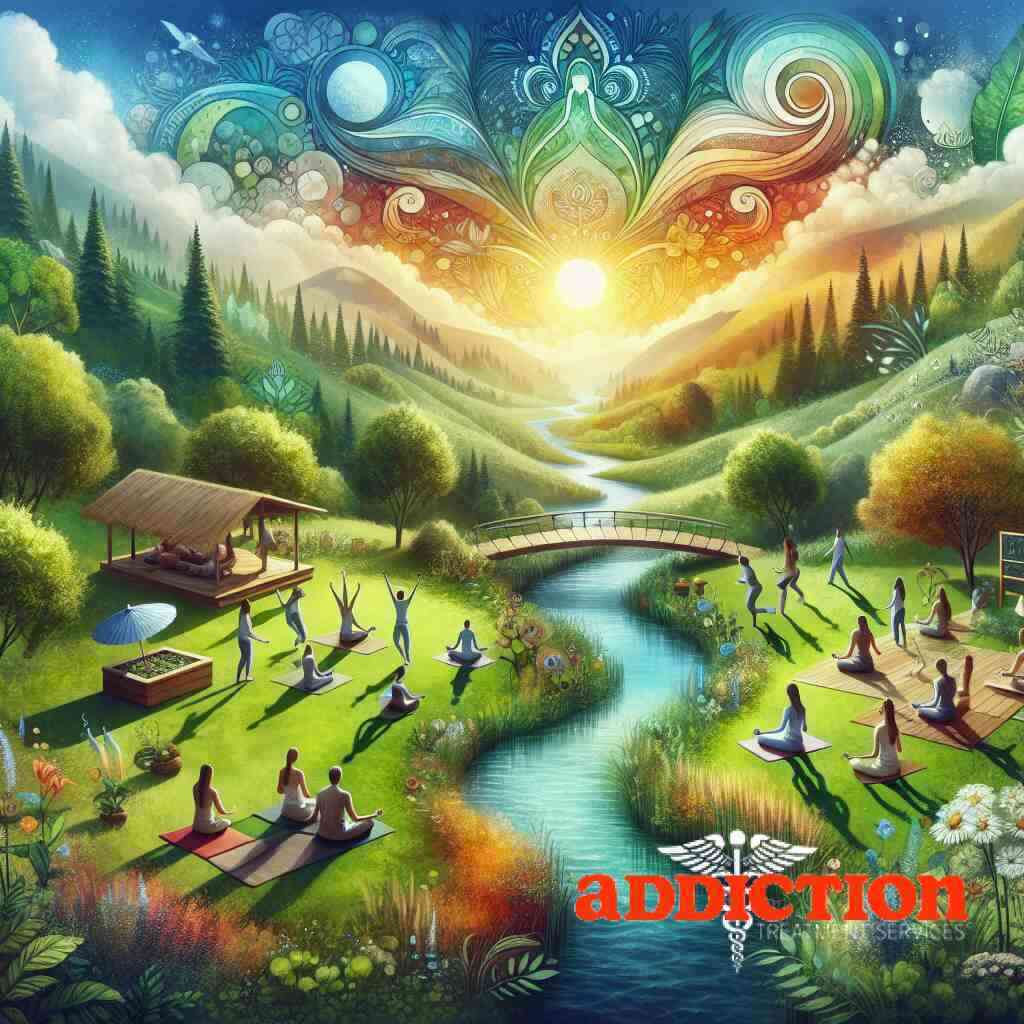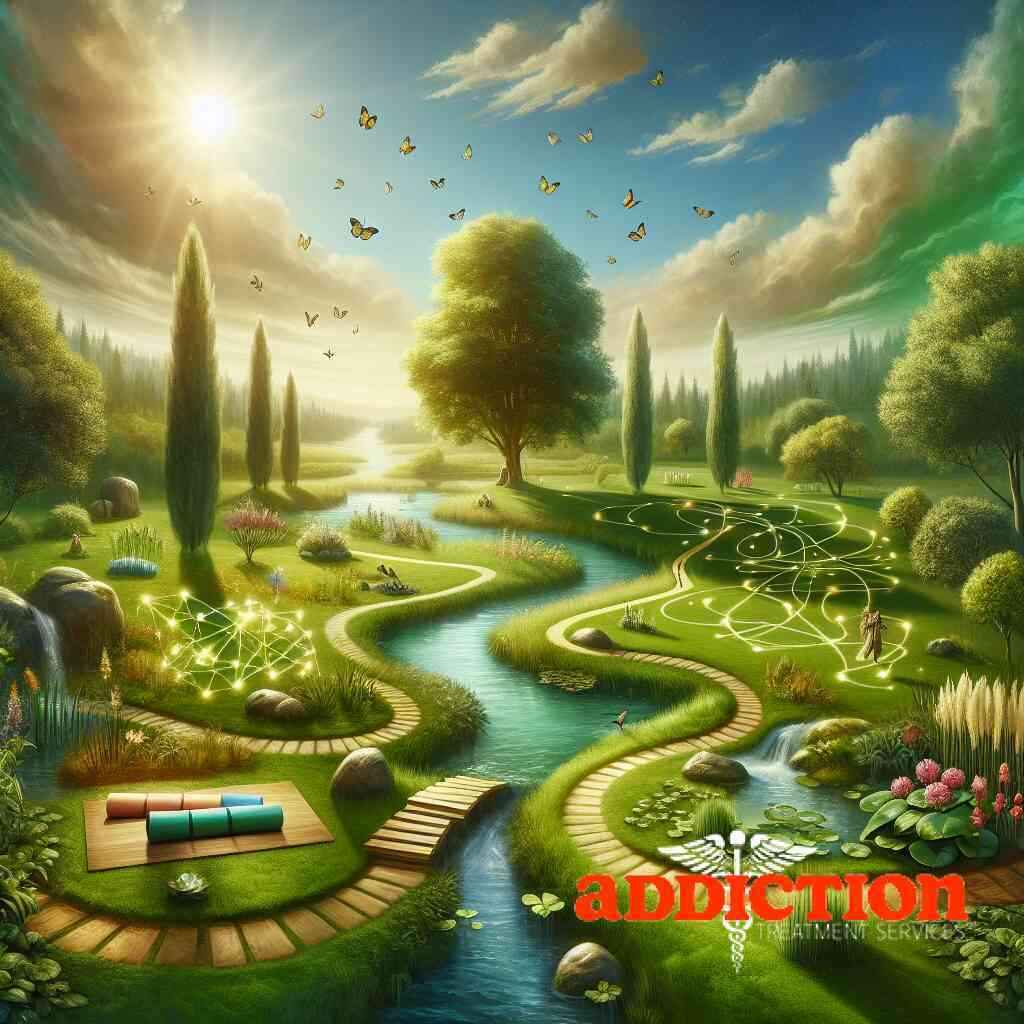 Posted On: 03/29/2025
Posted On: 03/29/2025Unlocking the Path to Holistic Recovery at Addiction Treatment Services
The Essence of Holistic Wellness in Addiction Recovery
Holistic wellness in addiction recovery transcends traditional treatment approaches, embracing a comprehensive view of healing. It acknowledges the complex interplay between the mind, body, and spirit, crucial for lasting recovery from substance abuse. At Addiction Treatment Services, we understand that true transformation arises from addressing all aspects of health, not just the absence of addiction. Our approach integrates physical detoxification, mental resilience, and emotional healing to facilitate a well-rounded recovery experience. By prioritizing holistic wellness, we aim to empower individuals with tools and strategies for sustainable recovery.
Integrating Mind and Body for Comprehensive Healing
The integration of mind and body is a pivotal element of comprehensive healing at Addiction Treatment Services. By fostering a strong mind-body connection, our treatment programs facilitate greater awareness and understanding of one’s own physical and emotional needs. Techniques such as yoga, meditation, and mindfulness are incorporated to help clients achieve a sense of balance, reduce stress, and enhance overall well-being. This integrative treatment approach ensures that both physical symptoms and emotional pain are addressed simultaneously, promoting a more profound and enduring recovery.
Spiritual Healing: Bridging Emotional and Physical Wellness
Spiritual healing plays a vital role in bridging the gap between emotional and physical wellness during recovery. At Addiction Treatment Services, we recognize that spirituality can offer profound support in navigating the challenges of addiction. By fostering a sense of purpose, hope, and connection beyond the self, individuals can achieve greater emotional equilibrium and resilience. Through various spiritual practices and therapies, we support our clients in exploring and strengthening their spiritual beliefs, thereby enhancing their recovery journey. This spiritual healing not only aids in emotional balance but also reinforces the physical wellness essential for fulfilling sobriety.
The Core Principles of Holistic Addiction Treatment
Personalized Treatment Plans: Tailoring Wellness to Individual Needs
At Addiction Treatment Services, personalized addiction plans are the cornerstone of our holistic approach, recognizing the unique journey each faces in recovery. By assessing personal histories, addiction patterns, and health requirements, we craft tailored strategies that address specific needs and preferences. This personalization ensures that every client receives a roadmap to recovery that aligns with their life goals and personal circumstances. Embarking on a personalized recovery journey involves continuous evaluation and adjustments, with therapists and support staff actively engaging in adapting treatment as progress is made. By prioritizing personalized care, we not only enhance the efficacy of treatment but also empower individuals to take ownership of their recovery process. Through this dedication to individualization, we create pathways that pave the way for successful and sustained sobriety.
Embracing Alternative Therapies for Sustainable Recovery
Incorporating alternative therapies for recovery enriches the treatment landscape by providing diverse healing modalities that resonate with different preferences and experiences. Methods such as art therapy, acupuncture, and equine-assisted therapy have shown promise in alleviating stress and fostering emotional release. These therapies complement conventional techniques, expanding the resources available to individuals for facing the multifaceted nature of addiction. By integrating such innovative therapies into our programs, Addiction Treatment Services enhances the opportunity for holistic healing, acknowledging that each individual’s pathway to recovery is distinctive. Exploring New Addiction Approaches: Winter 2025 Consequently, embracing alternative therapies not only broadens the scope of recovery options but also deepens the holistic experience, providing varied tools for managing triggers and emotional disturbances. This comprehensive approach to treatment supports the development of coping skills essential for maintaining long-term sobriety and wellness.
The Role of Nutritional Support in Holistic Addiction Care
Acknowledging the impact of nutrition on mental and physical health, nutritional support in addiction recovery is an integral component of our holistic addiction care framework. Nutrition significantly influences the body’s ability to heal and replenish itself, particularly after the toll of substance abuse. By incorporating dietary guidance and counseling, we aim to restore balance to the body’s systems, improve energy levels, and enhance mood stability. Proper nutrition aids in minimizing withdrawal symptoms and enhances overall treatment outcomes by supporting cognitive function and mental health. Our experts work closely with clients to develop individualized nutrition plans that align with their recovery goals, ensuring that dietary habits contribute positively to the healing process. Thus, nutritional support is not merely an ancillary service but a pivotal aspect of comprehensive recovery, fostering physical rejuvenation and psychological resilience throughout the recovery journey.
Integrative Treatment Approaches: Beyond Conventional Therapy

Exploring Natural Healing Methods for Substance Abuse
Harnessing natural healing methods can significantly augment the recovery process from substance abuse. At Addiction Treatment Services, we appreciate the value of integrating these approaches to facilitate a comprehensive and nurturing environment. Techniques such as aromatherapy, herbal remedies, and natural healing in sobriety offer clients alternative paths to wellness, supporting physical and emotional healing. These methods, when combined with traditional therapies, create a more personalized and effective recovery plan. By embracing these practices, individuals not only address the physiological aspects of addiction but also nurture their mental and spiritual well-being, paving the way for a more resilient recovery journey.
The Power of Emotional Balance in Achieving Long-Term Sobriety
Emotional balance is paramount in achieving and maintaining long-term sobriety. At Addiction Treatment Services, fostering emotional health is a core element of our holistic recovery programs. Techniques such as cognitive-behavioral therapy and emotional regulation strategies are implemented to help clients manage triggers and emotional upheavals. By developing skills to cope with stressors and emotional fluctuations, individuals are better equipped to navigate the challenges associated with sobriety. The integration of these practices into treatment programs ensures that clients can build a strong emotional foundation, which is essential for sustaining long-term recovery and preventing relapse.
Nature and Ecological Therapies in Mental Health Recovery
Nature and ecological therapies offer transformative effects in mental health recovery, providing a unique modality for healing. Immersion in natural settings can reduce stress and enhance mood, promoting a sense of peace and connection. At Addiction Treatment Services, incorporating elements like nature walks, gardening, and outdoor therapy supports clients in reconnecting with the environment and their inner selves. These practices not only aid in alleviating anxiety and depression but also encourage holistic interaction with the world. By embedding these ecological therapies within our treatment programs, we offer clients a deeper, more comprehensive recovery experience that nurtures both mental health and overall well-being.
Connecting with Comprehensive Addiction Care Services
The Role of Addiction Treatment Services as a Lifeline
Addiction Treatment Services acts as a lifeline, offering an accessible and supportive pathway for those grappling with substance use disorders. We simplify the daunting search for appropriate care by providing a comprehensive addiction treatment directory that caters to individual needs and preferences. With resources available across all 50 US states, our team ensures individuals and families can find reliable treatment facilities near them. From alcohol and drug addiction treatment to holistic recovery approaches, we emphasize empowering individuals through informed choices. This network of addiction treatment services plays a pivotal role in guiding clients toward effective intervention programs, ultimately nurturing a sustainable recovery process.
Navigating the Recovery Process: From Detoxification to Aftercare
The recovery process entails various critical stages, spanning from detoxification to integrated aftercare solutions. At Addiction Treatment Services, we provide guidance and support at each step, facilitating a seamless transition throughout the journey. Detoxification serves as the initial phase, preparing the body to embark on a healthier path by eliminating toxins. Post-detox, clients engage in therapy programs tailored to their specific needs, utilizing alternative therapies and other treatment modalities. Following initial recovery phases, aftercare programs play a crucial role in sustaining progress, offering continuous support to mitigate relapse risks. Best Practices for Relapse Prevention Techniques in 2024 Through a well-coordinated approach, individuals receive comprehensive addiction care that fosters resilience and long-term sobriety.
Holistic Support Systems and Recovery Lifestyle Resources
Holistic support systems are integral in empowering individuals on their recovery journey by promoting wellness across multiple dimensions. Addiction Treatment Services collaborates with treatment facilities to offer resources that address physical, emotional, and spiritual health. This includes access to mental health recovery resources and therapies designed to enhance the mind-body connection. Recovery lifestyle resources such as community support groups, workshops, and educational materials further reinforce the commitment to sobriety by facilitating a supportive environment. By integrating these resources into treatment plans, individuals can cultivate a balanced recovery lifestyle that aligns with their personal and holistic wellness goals.
Conclusion: Embracing Holistic Recovery for a Fulfilling Sobriety Journey
The Continuous Journey of Mind-Body-Spirit Integration
Achieving holistic recovery is a continuous journey of integrating mind, body, and spirit. This ongoing process requires dedication to personal growth and mindful practices that nurture overall well-being. Guide to Advanced Holistic Addiction Care Services At the core of this journey is the recognition that sobriety is not only about abstaining from substances but also enhancing emotional and spiritual health. By engaging in therapeutic programs in Georgia, individuals can strengthen their connection to themselves and their environment, paving the way for sustainable recovery. Addiction Treatment Services supports this integrative approach, fostering an environment where clients can explore and deepen multiple aspects of wellness. Through consistent practice of mind-body-spirit integration, individuals can develop the resilience needed to maintain a fulfilling sobriety.
Crafting a Sustainable Recovery Lifestyle for Future Success
Building a sustainable recovery lifestyle involves crafting a routine that supports long-term sobriety and personal growth. Top Techniques for Managing Withdrawal Symptoms Near You This encompasses incorporating activities that promote physical health, emotional stability, and spiritual fulfillment. By embracing practices like nutritional support and natural healing, individuals lay the groundwork for enduring success. Addiction Treatment Services encourages crafting personalized recovery journeys tailored to individual strengths and challenges. This involves ongoing assessment and adaptation of lifestyle choices to ensure alignment with recovery goals. Such a commitment to personalized wellness fosters a strong foundation for overcoming obstacles and leveraging personal experiences for future success.
The Promise of Holistic Addiction Treatment at Addiction Treatment Services
Holistic addiction treatment offers a promising path to recovery by addressing the multifaceted nature of substance use disorders. Addiction Treatment Services provides access to a wide range of holistic recovery approaches that cater to diverse individual needs. By integrating alternative therapies, spiritual healing, and comprehensive care strategies, clients receive a well-rounded treatment experience conducive to long-term recovery. This approach not only empowers individuals to overcome addiction but also equips them with the tools to lead a balanced and purposeful life. The guidance offered by Addiction Treatment Services acts as a beacon for those seeking a transformative journey in recovery, underscoring the potential for profound healing and personal growth.
Frequently Asked Questions
Question: What does holistic recovery mean at Addiction Treatment Services?
Answer: At Addiction Treatment Services, holistic recovery transcends conventional treatment approaches by addressing the mind, body, and spirit to facilitate comprehensive healing. By integrating physical detoxification, mental and emotional resilience, and spiritual healing, we offer a well-rounded recovery experience. Our personalized treatment plans are crafted to align with each individual’s unique journey, ensuring that they not only overcome addiction but also achieve lasting emotional balance and physical wellness for sustainable sobriety.
Question: How do alternative therapies enhance the holistic recovery process at Addiction Treatment Services?
Answer: Alternative therapies are a cornerstone of the holistic recovery process at Addiction Treatment Services, expanding the treatment landscape with diverse healing modalities. Techniques such as art therapy, acupuncture, and equine-assisted therapy complement traditional methods by alleviating stress and fostering emotional release. These innovative therapies resonate with individual preferences and experiences, enriching the holistic wellness journey. By offering varied tools for managing triggers and emotional disturbances, we enhance the development of coping skills essential for maintaining long-term sobriety and wellness.
Question: What role does nutritional support play in holistic addiction care at Addiction Treatment Services?
Answer: Nutritional support is integral to holistic addiction care at Addiction Treatment Services, profoundly impacting both mental and physical health. Proper nutrition aids in the body’s recovery and replenishment post-substance abuse, helping to minimize withdrawal symptoms and enhance overall treatment outcomes. Through individualized dietary plans and counseling, our clients receive essential guidance to restore their body’s balance, improve energy levels, and stabilize mood. Nutritional support goes beyond being an ancillary service; it is a pivotal aspect of comprehensive care that underpins physical rejuvenation and psychological resilience.
Question: Can you explain how Addiction Treatment Services integrate nature and ecological therapies into their recovery programs?
Answer: At Addiction Treatment Services, we integrate nature and ecological therapies into our recovery programs to offer transformative effects for mental health recovery. Immersion in natural settings through activities like nature walks, gardening, and outdoor therapy promotes stress reduction, mood enhancement, and holistic interaction with the world. Such ecological treatment approaches not only aid in alleviating anxiety and depression but also foster a deeper connection with oneself and the environment, enriching the client’s overall recovery journey and encouraging sustainable sobriety.
Question: How does Addiction Treatment Services support the continuous journey of mind-body-spirit integration for a fulfilling sobriety?
Answer: Addiction Treatment Services supports the continuous journey of mind-body-spirit integration through programs that emphasize personal growth and mindful practices essential for enhancing overall well-being. We foster an environment where clients can explore and deepen multiple aspects of wellness by engaging in therapeutic programs that align with their unique recovery goals. This approach underscores the importance of sobriety beyond abstinence, encouraging the pursuit of emotional and spiritual health to build the resilience needed for a fulfilling and sustained recovery journey.



